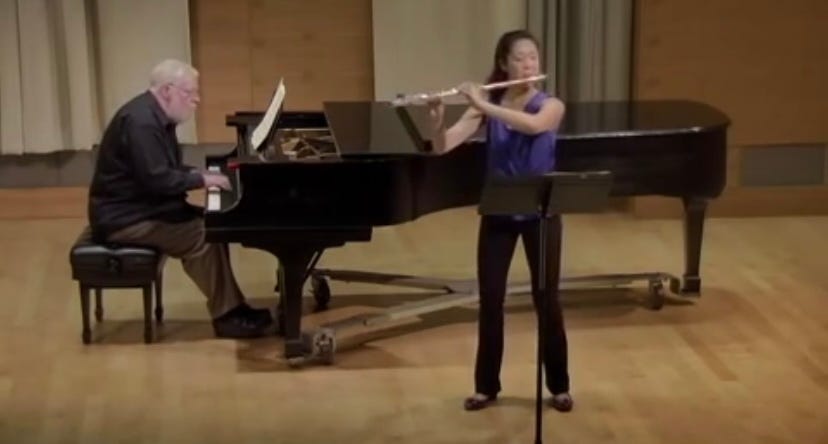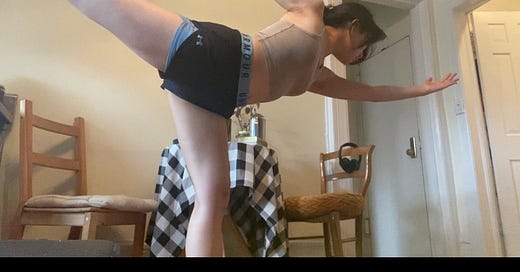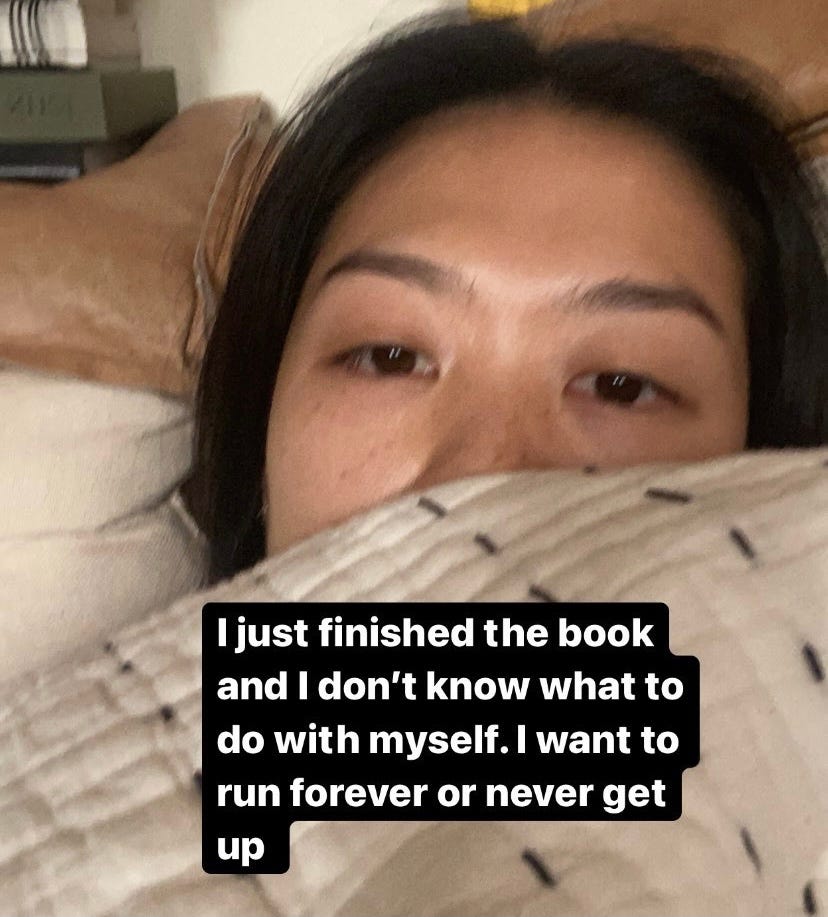What the Doctor Ordered
Hawks in Manhattan, Yoga Breaths, and Lessons from Depressing Literature
More and more I find that while these long form reflections don’t seem to be about food on the surface, for me, they ultimately are - life, food, senses, memories, and identity are all tightly and wondrously entangled. I hope you all take time to stretch and reflect and really listen to yourselves this weekend.
There was a longer gap between this post and the previous ones, but again, I’m listening to my mind and my gut. Subscribe for more musings when they come if you haven’t already.
Last week, I went to the doctor because I could sense that I was coming down with something. It was a lot of the symptoms of a viral situation, with swelling in all the parts you expect swelling, but of course, my paranoid pandemic-trained self assumed all ailments funneled into deeper evil. That blister on my foot from walking last week? Infected, and my leg will fall off. Those knots at the base of my skull? Lymph nodes, so cancer. Such is the spiraling of living within four walls and being both keenly aware of your body and somehow out of touch with it.
So, as I sat on the examining table at the office, saying hello to this doctor for the first time, I rambled out all of these overblown concerns. He did the usual – light into the throat, look at my foot, pressure on the sides of my neck. When he pressed on the base of my skull though, he gently relaxes his hand, looks at me and asks, “Are you stressed lately?” The sound that escaped my gut before I could stop it was truly a guffaw, one of those deep air kicks that emits like a blowhorn. I couldn’t help myself. What a comedic question! In a pandemic! But he didn’t laugh back and as the quiet settled around us, I felt the spot between my tear ducts above my nose bridge tingle. Because I realized this was perhaps more concerning than a brutal medical culprit - something inside of me was so distressed for so long that it has literally physically manifested into two lumps at the base of my skull.
I’ve always been a clencher. And by that I mean someone who desperately wants to tie sandbags around my ankles to prevent the gales of life from swallowing me. I remember in the third grade when we would have pop quizzes for math. The manila privacy folders would go up, the timer set on the whiteboard, and my little left hand would slide into the edge of the desk like a tie clip and clasp so hard that a sticky oily mark would stay until the end of the day. I still have a flat callous on my right ring finger from years of perfecting my iron pencil grip. Times tables, in the scheme of my life, are low stakes, and yet, even at 9 years old, it felt that by holding onto dear life, I would be alright.
Stress was always something I could ironically suffocate out of existence. There were due dates, concert dates, project deadlines, unforeseen circumstances to hack my way through – but these all had a termination, a point at which stress would presumably ease, at least for the time being. And that made gripping all the more tenable. In high school, I was doing AP classes, traveling for competitions, taking art classes, going to 5 hour orchestra rehearsals, volunteering at the local art museum, worried about teenage social life, confused about a white female dominated Youtube makeup culture, and obsessed with training my dog to jump through a hula hoop. Amidst all of that, I was recording videos for conservatory prescreens, which for those of you not in my music bubbles, is basically a 15 minute sizzle real that determines whether or not you get to go to music college and feels at the time like the sonic airwaves that encapsulate the entirety of your self worth. I remember being in my second recording session, which mind you is impossible and extremely expensive to book, and my wrist just gave out. In retrospect, I definitely had given myself carpal tunnel because I could truly feel the nerves in my left wrist screaming out and occasionally, one wrong pressure point on my index finger would leave my entire forearm numb. I left the session distraught, and I cried all the way home.

There’s something so sad to me about thinking of 17-year-old Annie clenching a metal rod to the point of injury. Because it doesn’t feel so different from me now, shocked to receive a doctor’s orders for me to relax. In reflecting on the elementary school quizzes and the college prep recordings, I don’t actually think pressure in my body was an attempt to secure a golden future – it was my resistance to spinning out, it was me folding my arms into my chest like an ice skater, hoping that I could repel a world whose playbook I could never predict by rotating faster and faster into myself. I tried so damn hard because I didn’t know what else to do.
Yesterday I was thinking about the worst thing anyone has ever said to me. And as a 25-year-old woman I’ve gotten my share – racial insults, sexual slurs, attacks on my character, negations of my intelligence. None had ever really kept me up at night, but I do remember one well meaning teacher analyzing my motivations for trying so hard at everything. He told me, specifically about my flute playing, that I was driven by excellence. On the surface quite innocuous, this comment left me perplexed and dug at me for longer than I care to say. Because being driven by excellence is a losing game. I want to be driven to music – to anything - by love, by community, curiosity or inquisitiveness. By beauty. Who determines what is excellent? And in relationship to whom? Can you achieve excellence? And if you don’t, is the entire path there a tortured one? Even being placed in front of a judging panel with the same packet of 30 second tunes as 100 others and ranked on your ability to follow customs, then announced as a talented specimen was a system that never sat with me. I don’t want to be driven by excellence because rather than exploring the wonder of human ability, the pursuit of pure excellence feels to me like gripping onto the desk for a test you’ll never pass. How can I place my efforts in a more generous place?
In my attempt to relax, I took a walk on Wednesday afternoon to the park. As I sat on a bench facing some trees, I heard a loud rustle in the branches and then saw a flash. A hawk with a field mouse in its talons emerged from the ground brush and landed on a tall stump mere feet in front of me. I heard the squeals of the mouse and I said “oh my god” out loud. Here was a scene that might as well be voiced by David Attenborough smack dab in the middle of Manhattan. I couldn’t help but laugh at the absurdity of this place – a city in which I truly could not predict something as simple as a walk in the park. I was more than apathetic about New York for my first year here, but once opened up to the world of food, to the curiosity of the unlimited senses, it felt like every square inch held a gold mine. What can you possibly grip in this city? I could bike to an ice cream shop on a Saturday only to find a sign scotch taped to the door telling me that all machines were out of order for repair, or walk across the street and encounter a mandolin band coaching a group of pick up dancers, and ten shops in a 2 mile radius claim to have the world’s best bagel. New York city pries my hands open. The trains will be late. Someone will yell at you. There will certainly be piss on the ground. A hawk will eat a mouse in front of your very eyes. I have no idea what is going to happen and there is no panel to please, no map to tell me when I’ve made it. No one cares about your excellence.
Alice Waters once said that the best way to get to someone, to really speak to them, isn’t through words, but through the senses – in her case, through eating something spectacular because then you know they are listening. And I’m realizing that it is through listening to myself, honing in on all my senses, that I can begin to actually hold myself. This form of arms-to-chest-spinning-inwards isn’t built on force and wrangling, but on care and openness and possibility. It is built on love for the abundance of our bodies and not on the scarcity of judgement.
I’m reading Yiyun Li’s Where Reasons End right now, a tragic imagined conversation between her and her son who committed suicide, and it is a meandering through grief sans timescale. In one part, the son and mother, who takes on the first person voice, speak about projecting oneself into the world. The son complains that the mother always puts on an act, dulling herself to be soft around the edges so that people don’t notice her space. She says, “The world never tires of dimming the bright and blunting the sharp. It’s good to avoid suffering when one can.” To which the son replies, “So you play a dumb version of yourself. Are you suffering any less?” To expedite how you assume the world already casts you is seeing life as this prewritten playbook, a rigid external determination that encourages us to ignore ourselves. I can grip as much as I want, feel like I have enough sandbags at my feet, but really, a hawk could come pluck me off the ground at any moment. In fact, my undoing in this case wouldn’t even ultimately be at the talons of a large predator, but in the self-inflicted knots right between my ears. Am I suffering any less?
I have really been leaning into the sad literature. After I read Hanya Yanagihara’s A Little Life on Christmas Day, I wanted to scream. I ran two miles along the river to try and force the chill out of my bones. I wanted so desperately for a happy ending, for there to be a resolution to the suffering, and yet the final tragedy knocked the air out of my lungs. Life is just random. My sister reminded me when I called her in distress that this may in fact be the raison d’être of the book - a 800 page slice of life, a slice that intersects with other slices and creates a web that ultimately has no destination or point or rules or reason. Tragedy might strike or it might not and to think of fairness, at least in those cosmic terms, is another form of moot clenching, one that dulls the senses from the moment. One might forget that amidst the overarching tragedy of the book, there is a love that is so utterly beautiful.
At the suggestion of friends, I’ve started yoga again after a long pause. I’m feeling the knots in my skull relax, and they are not as tender as before. The first time I tried meditating in college, I lost it because ungripping and settling into blank thoughts within a body that desperately tries to organize them was far too much for me at the time. What else do I have to hold besides myself? But holding is different than gripping just as a doctor’s testing hand can soften into care. Feeling like I am clasping my life is different than Alice Waters’ invitation to really let your senses guide you. To trust fall into yourself. I can’t quite picture an end to this pandemic yet, and more urgently, how I will feel one year from now, five, ten. I’m working on letting my arms unfold, spreading them out and over me and breathing in and out, in and out, knowing that 20 minutes away from the phone and my plans is another form of coming into myself. It’s knowing that cooking, this frantic spontaneous energy that demands my full senses and attention and joy is a way to feed myself rather than chip away. Li’s book pokes at another point that left me nodding, which is that those of us that move through life with intensity have the most trouble with frivolity, the key in many ways to happiness. Even my fun venture into food has evolved into 700 plus Instagram posts and this very emotional blog. But I know inside me something I wasn’t sure about before. I reject that idea that I’m motivated by excellence. I feel joy and love and wonder and this humility when my senses, even with one technically dulled against my wishes, remind me that my body is the only thing that is really mine.
When I saw the hawk and the mouse, I couldn’t look away, and I thought of the phrase “eating myself alive,” where the object and the agent are the same. It’s me. There is no amount of gripping and intensity that will change the state of this world and pandemic. There is no amount of dulling myself that will make me suffer any less. With each morning of stretches and inhales and exhales, each bite of wonderous produce, I try to remember that to actually be in control of myself is to listen to my senses, trust in where I am today. It does not negate any pain felt or suffering, but it lets me accept them, tuck them away for a moment, and slowly cut the sandbags loose.






Annie this was truly such a beautiful message to come home to after a tiring day at work, a tiring week of confusion, worry, fear or failure and feelings of self doubt all tangles together- control is a concept that has crippled my soul and starved me from the freedom of fully expressing my self in the quest of perfection or as you said, excellence. I’ve realized this doesn’t exist, and at 21 years old I’m struggling every day to decide how to prioritize my responsibilities and self-imposed projects, goals, etc. But this year I have come to see that even though feeling in control of myself (for me this manifests through over exercise and disordered eating) which although may appease my anxiety and fear for the present moment in which I feel “in control”, is only draining my energy of keeping me from experiencing the vibrancy and joys of listening to my present, intuition. It keeps me from experiences with friends, family, art, my passions, all because of the amount of energy exercising control takes up in my life. End of the day: I hate control, control needs to leave, It’s fake, phony, no good. Maybe this all made sense, most likely not, but your post today helped remind me that this control I can’t let go of won’t leave me alone until I stare it dead in the face courageously and let it go. Alas, today isn’t the day. I’m too tired to give up control today- ha, wow.
Thank you for sparking reflection and giving me this time to pause and just free journal I guess on your blog- hopefully that’s ok! Sending love and sun💛